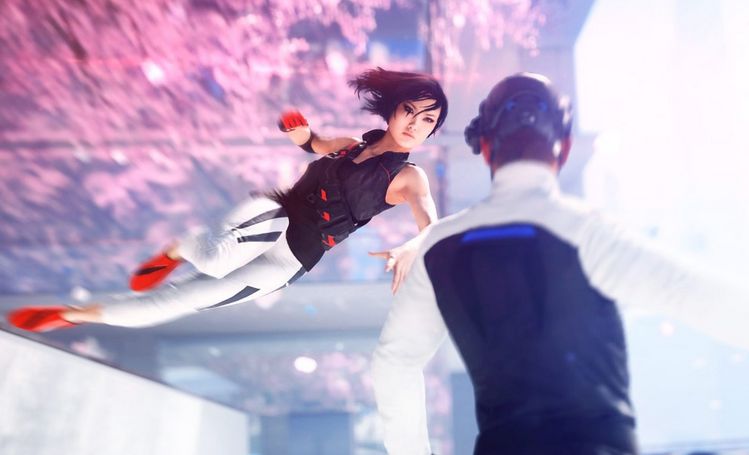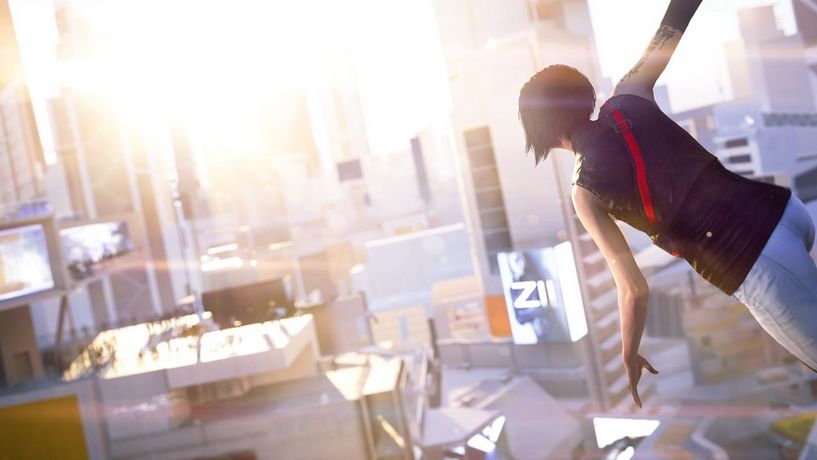Mirror's Edge gets easier combat and an open world

I completed Mirror’s Edge four times, so I know the first person parkour-’em-up stupidly well. To me, Catalyst feels almost exactly like the Mirror’s Edge of 2008 in all the right ways. The platforming feels identical minus a couple of button press changes that only super hardcore players will notice, and my same muscle memory and sense of timing served me well during my hands-on at E3. For those worried that Catalyst might lose the very specific essence of the original, this doesn’t feel like a reboot—it feels like a true sequel.
My demo took place in a tiny snippet of what is apparently a seamless open world in Catalyst, a series of rooftops with three tasks to perform: a time attack run (Race), a chain of combat encounters (Delivery) and a challenge to climb to a high point in the world and hack a propaganda billboard (er, Billboard Hack). My main reaction to the demo was delight at how it felt to finally have more Mirror’s Edge in my hands, after seven years of championing the game to any poor bastard that will listen. There’s been six Call of Duty games since the first one came out—that Catalyst exists in a landscape of absurdly expensive triple-A games is a bit uplifting to me. Even better, what made the original Mirror’s Edge so special is seemingly still intact here.

What this 13-minute demo didn’t do was outline how open world play will work, since this area of shiny rooftops was boxed off and honestly felt like it could be a level from the first Mirror’s Edge. This setting will start small then open up, but how big does it really go? The map screen in the menu suggests a huge open city, but the demo doesn’t answer the question of how that’ll feel to the player to travel from one place to another.
Greater changes come in the form of the combat, which was divisive the first time around, but has been overhauled so it’s noticeably easier. While it seemed a little too simple to me on first inspection, it might suit players who found the original’s fighting too challenging or fiddly. Attacks are now mapped to the x button on an Xbox controller, rather than the trigger (this is now just the barge button for opening doors), and as long as you hit the button in close proximity to an enemy, Faith will quickly take them out, sometimes with a pleasing third-person finishing animation.

The demo didn’t really have enough combat to make a call on it either way. Combat presented no immediate threat, and with no guns for faith to pick up, DICE clearly gave this a little more thought than the platforming. What’s obviously different is that you can pretty much fight while still running, whereas Mirror’s Edge sometimes required more of a duelling mentality, where you had to circle around cover and ambush enemies, distracting from the pace of level. Maybe a complex fighting system just isn’t that important to Mirror’s Edge—I’ll need more time with Catalyst to be convinced by this change.
Mirror’s Edge was well worth reviving, and this demo tells me that Catalyst will look and feel familiar to the game’s existing audience. DICE should now focus on showing players how the open world really adds to that.
The biggest gaming news, reviews and hardware deals
Keep up to date with the most important stories and the best deals, as picked by the PC Gamer team.


